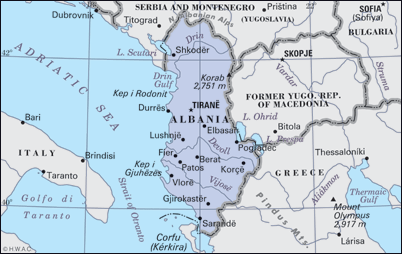Blood Feuds and Honor Killing: Not Just Foreign Affairs
By Jim Reynolds, Academic Program Chair for Online Criminal Justice
In the West we often think of blood feuds and honor killings as a Middle Eastern practice. Much has been made in recent media accounts of honor killings in Islamic countries and among Middle Eastern immigrants in Western nations. The religion of Islam gets a lot of the criticism for this practice, but blood feuds and honor killings are ancient tribal behaviors that far predate the establishment of Islam in the 8th Century.
Albania, which is European, not Middle-Eastern, is home to such a culture, with an honor code that was formalized and recognized as the law of the land until the rule of communism following the Second World War. The law is known as the Kanun, or the Law of Leke Dukagjinit , the 15th Century Albanian prince credited with codifying customs and behaviors dating to the Bronze Age. Although blood revenge is allowed under the Kanun, the law actually allows for forgiveness and dismissal of the blood debt by the victim’s family. According to the Kanun, there is greater honor for the aggrieved who forgives than the one who obtains blood revenge. That concept seems to have been lost in translation for many mountain families.
The philosophy seems to be that if the killing is based on family honor it becomes excusable homicide. Blood feuds are all about family honor ; the government doesn’t get involved. The twist in Albania is that one killing begets a revenge killing, which begets another, often for generations. Although the Kanun does not allow for the killing of women in this chain of events, that constraint is now being reconsidered by some families since male members under threat seldom leave their fortified homes. Several women have been killed, although the mainstream adherents to the Kanun denounce the practice.
We might say this all sounds crazy, but the parallel for the American perspective is street gang culture. Although far removed from the mountains of the Balkans, the retaliatory murders we see almost daily in Los Angeles, Chicago, and other urban areas reflect many of the same values; namely, the honor of the group, the need to avenge blood with blood, the need to maintain and defend the group to ensure its survival.
What other parallels are there? For one, isolation from mainstream society. The blood feud occurs in rural, mountainous Albania, away from its few small urban areas. Much of the blood feud and honor killing behavior occurs primarily in isolated areas, or places that until the population and travel explosion of the 20th Century had for centuries been isolated with strong ethnic and tribal roots. The legendary Hatfield-McCoy feud of the Appalachian areas of West Virginia and Kentucky at the end of the 19th Century is a clear American example of such behavior. Street gang isolation is cultural and economic more than geographic. Although surrounded by often millions in urban areas, street gangs draw membership from the socially isolated and disenfranchised.
Law, or lack of it, is another parallel. The current Albanian government, the Communists before them, and even the Ottoman Empire in the 15th Century found it easier to allow the mountain families to live by the Kanun rather than invest the time, treasure, and lives necessary to rein them in. Some may agree that our own government lacks the will to effectively deal with street gangs, and makes do with the resources they have. This leaves police, prosecutors, and our correctional system shoveling sand against the tide.
What’s the solution? Darned if I know, other than step up and make serious efforts to change hearts and minds. We might actually have it easier than the Albanians. We certainly have more resources available. Despite some forms of isolation we have many common socializing factors to bring into play, such as schools, churches, and a broad and pervasive media. We also need to be willing to play the long game, something the Albanian mountain families know well. They have been able to successfully push back for millennia; doubtless the Greeks, the Romans, and the Byzantines tried and gave up long before the Ottomans. Street gangs do the same, resisting programs and enforcing a code of silence that impairs effective law enforcement. From the mainstream, we allow the news cycle and the election cycle to keep us playing a short game, focused only on the next tactic rather than the strategic goal.
Florida Tech Online’s Criminal Justice degrees offer more exploration of these critical topics. Our program includes courses on gangs and organized crime, as well as international crime. Students learn to take a world view and make local connections. The Forensic Psychology programs on campus, and online as part of the Applied Psychology degree, look at the behavioral aspects that lead to gang behavior and affiliation.





